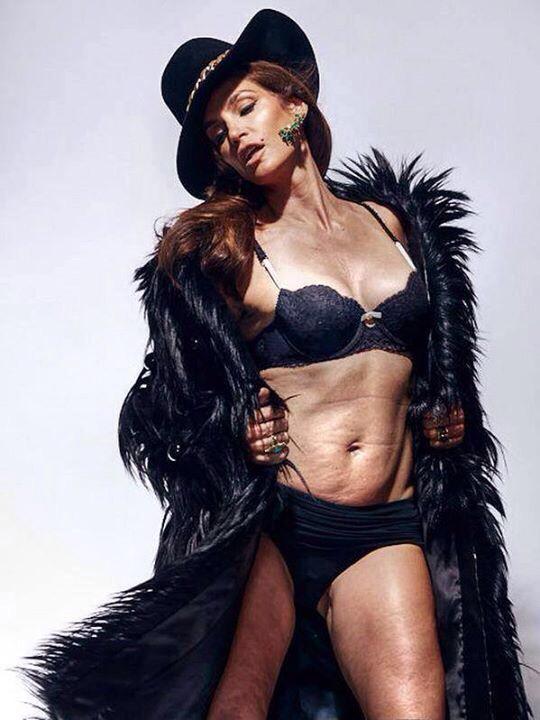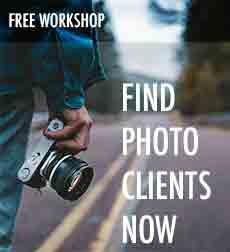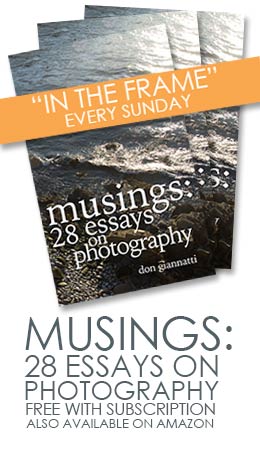A few days ago, this was making big news online… wow. Imagine Cindy Crawford having the guts to go public in a photograph that was un-retouched in Photoshop.
Yeah… wow. Big F’n Deal.
Of course she did that for two decades and more. You know that, right?
Of this I can speak firmly. We didn’t have Photoshop in the 40’s. 50’s. 60’s, 70’s, 80’s, 90’s. At the beginning of the 2000’s it was being used a bit more, until we arrive at today where the non-use of it seems to be big news.
Here is Cindy, circa 1980’s. NO Photoshop.
(Christy Brinkley, 80’s) (Christy Turlington, 80’s) (Elle MacPherson, 80’s) (Tyra Banks, 80’s) – NO PHOTOSHOP
For people who have NO sense of history, how it all became. They gotta 5DMKIII and LIFE STARTS NOW.
Crap.
We will look at the insincerity of the photograph of Cindy in a moment, but first a history lesson.
We made the photographs using skills in lighting. LIGHTING. L I G H T I N G.
We had a cadre of amazing MakeUp Artists, Stylists, Lighting Assistants… all focused on making the image – perfect. Cause there was no ‘fixing’ them later.
Imagine that.
We made prints lovingly and by hand in dark, smelly rooms that perhaps robbed us of a few years of longevity.
Those prints were lovingly delivered to magazines where they were sent for halftone scans. (No, they did not have banks of ‘retouchers’ to ‘airbrush’ each editorial image. Anyone who tells you that was never there, and making that shit up. DIDN’T HAPPEN.)
We also shot this magic stuff called “Transparency” film… a ‘slide’ by another name. The image was what it was. If you blew exposure by a 1/3 stop, it was there for all the world to see in the transparency. If you missed focus you ended up with what we would technically call a ‘soft image’… no amount of work at the scanning houses was going to fix it. And many ‘soft’ images made it into print… because ART.
Find a few 80’s / 90’s Vogue, W, Italian Vogue (my favorite), Bazaar or other fashion magazines. Find a few early issues of People, Time, Life, Look, – hey – find a magazine printed before 2003 – ANYGDAM one. NO. PHOTOSHOP.
PHOTOGRAPHY done right by craftspeople and artists and damned skilled creators. Guess what we never said? “Fix it in Photoshop” – cause we. like, didn’t know what that meant in 1987.
So now someone wants you all to believe that PHOTOSHOP is the magic beans of photography. Well, it isn’t.
Light is.
Which brings us to the current image of Cindy…

… and why I call BS on it.
Light.
This shot of Crawford was LIT to show her “flaws”. It was PURPOSELY created to show texture and line and the signs of age. It is NOT simply un-retouched, it is, in fact, ENHANCED through the lighting.
If you brought a model who looked like this to any decent photographer, they could choose to mitigate with lighting (soft non-directional ambient, or large scrim, plenty of fill) or enhance with small, single light source MEANT to bring out any ‘imperfections’ the woman may have.
(NOTE: Before we get pulled into one of those lameass discussions of what ‘beauty’ is, let’s not go there. My belief is that Crawford was and will always be a stunning woman. Age is not a digression in her appeal. Beauty comes in all sizes, shapes, and ages. I stopped shooting fashion BECAUSE I grew weary of shooting 17 year old ‘babies’ who were meant to personify ‘all women’. This whole thing may be a cause-celeb for a lot of folks. I walked away from a solid business because of my beliefs. Beauty if NOT made in Photoshop… and all of my subjects are beautiful to me, no matter who and how old they are.)
However, this image is supposed to be a rally point for the “anti-photoshop” groups, and those for whom the cause of the moment is so awesomely cool, man, they just have to be, like, involved… #trending… #badphotographsrockcausetrendingsaysso….
Is this a ‘bad’ photograph of Cindy Crawford. No, of course not. It is as perfect as the photographer CHOSE it to be. The photographer CHOSE a single lightsource with no fill to enhance every line/wrinkle/and skin anomaly that was possible.
But to champion it as a shot of Cindy being brave and shooting without Photoshop leaves that part of the equation, the most important part – LIGHTING – out.
So is the idea that Cindy is brave for not being Photoshopped? That’s no big deal. She has done that before.
Or is it that she ‘risks’ showing off some flaws of age? Well, she CHOSE that when she chose to be shot with this light… so shouldn’t it really be “Cindy Crawford shows us what a beautiful woman looks like with the passage of time”? Cause why would you light her like this and then Photoshop it… That would be stupid.
(Yes, I know… but I don’t want to go there… so stop it. Stop it now… heh)
Where do I fall on the Photoshop or No-Photoshop line. I use Pshop basically the way I used a darkroom. I strive to get it as right in the camera as I possibly can. It is in my photographic DNA, I suppose.
But I also don’t give a rats tushie what others do. I have no dog in this hunt, and usually find such discussions and ‘side taking’ utterly boring and useless.
So “Shop” away if you want. Or not.
But don’t peddle a prepared and purposely lit shot to show ‘flaws’ and expect me to believe that nothing else could be done but Photoshop. That is a lie… there is something we call…
Lighting.
Of course the disservice it does to the amazing photographers of that time… from David Bailey, to Watson, Elgort, Demarchelier, Lindbergh, Ritts, VonUnwerth, Roversi and more… just terrible.
We have an art form that doesn’t even acknowledge its past, but chooses to be led by people who do not have the best interests of photography at their hearts, but the quest for immediate fame and more “likes”… pathetic.






I’m not as skilled with lighting in order to know how to resolve the problem with light and keep the contrasty look on the skin. Soooo yes due to my inexperience I would use photoshop to delete the lines and celulite in order to keep the contrasty look on the skin because if there is a way to do it in camera I do not know it.
Can you comment on what you would do to minimize the skin problems WITHOUT taking the contrasty look on the skin? using more small lights as fill to fill all those spots and “bad lines”? Would using a scrim negate the contrasty look on the skin?
The other thing is. Isn’t this a “leaked” photo? The whole “she’s so brave” aspect is moot since she didn’t intend for the photo to get out.
Depends on what you want to do.
If you WANT to show the contrast/texture and anomalies on the skin, then by all means light it with a small, hard light. If you want to decrease them, then use a soft light, large source. Light does what it does consistently. Choosing to light her with contrasty light gives us exactly what contrasty light does… it shows a highlight and a shadow on each part of the texture.
If I were shooting it and wanting to mitigate the texture, I would certainly use a large, soft light source. This creates a wrap around light that diminishes the texture.
I have shot women of all ages, and knowing how to light them is very important… we get what we light.
This whole episode seems so phony and misleading that I decided to say a few words.
Bravo! You have one helluva crap detector.
You’re kidding right? What would you consider dodge and burn techniques? What about the fact that retouching as a term came about during the film era? What about the iconic work of people like Pablo Inirio? These kind of overly-gushy, overly sentimental, days of glory past articles smack of an author who has simply not kept up with the technology of his (or her) time.
MD… not sure you even have the slightest clue about what you read, how I see it, and my opinion.
Thanks for reading, but you missed the point by a mile.
Wow… LOL